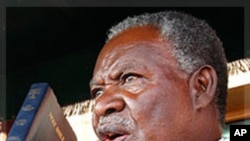After many attempts at drafting a new constitution, Zambia Monday unveiled a draft which recommends a decentralized governmental system and enhances the independence of the country’s electoral commission to conduct free and transparent elections.
Simon Kabanda, spokesman for the technical committee on drafting the constitution, said the draft also recommends that a candidate win 50 percent of the votes plus one in an election in order to be declared president.
“In the past processes, since we reverted to multiparty democracy, people wanted to have a majoritarian system of electing a president where the winning president gets 50 percent, plus 1, vote of the registered voters,” he said.
Kabanda said the draft constitution also calls for the president and vice president to be elected on the same ticket, as opposed to the current procedure of allowing the president to appoint the vice president.
“The rationale is that we do not want a situation where the president can hire and fire a vice president any time [he] feels like it,” Kabanda said.
He said the draft also enhances the independence of the country’s electoral commission.
“This, too, has been a contentious issue. People have lost confidence in the Electoral Commission of Zambia. So, whenever they conduct elections, political parties and, generally, the people are suspicious that the results are manipulated by the Electoral Commission of Zambia,” he said.
Kabanda said the draft constitution makes it difficult for the president to fire civil service employees by giving parliament the authority to rectify the appointment of government employees.
“What this constitution provides is actually security of tenure for many public officers that are employed so that they have, for example, a contract for five years, and the president does not have the hand to hire and fire immediately because parliament has been given more powers to rectify appointments of people into public office,” Kabanda said.
He said the draft constitution also provides for dual citizenship.
“What is required is that somebody should be a citizen. Whether the parents were citizens or not does not count in this draft that we have produced,” Kabanda said.
The draft constitution also includes a citizens’ bill of rights, including more rights for women, youth, children, and the disabled.
Kabanda said the Constitution Drafting Commission will hold forums around the country to get the input of the general public.





